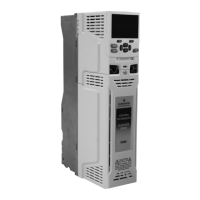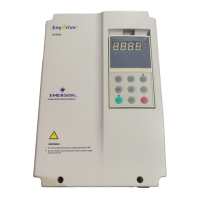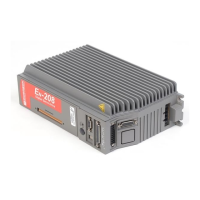Safety
information
Product
information
Mechanical
installation
Electrical
installation
Getting
started
User Menu A Commissioning
Advanced
Parameters
Diagnostics Optimization CT MODBUS RTU Technical Data
E300 Design Guide 217
Issue Number: 1
Minimum test current level used for Id during auto-tuning when measuring the motor inductance as a percentage of Motor Rated Current (B02). This
is then used in a similar way as Iq Test Current For Inductance Measurement (B38) to estimate the value of Lq used in the control algorithms as Id
changes. If Lq At The Defined Id Test Current (B42) or Id Test Current for Inductance Measurement (B41) are set to zero then no compensation is
made for changes in Lq with Id.
Motor q axis inductance with no current in the q axis and the current defined by Id Test Current for Inductance Measurement (B41) in the d axis of the
motor. If this parameter is left at its default value of zero then no compensation is made to the value of Lq with changes in Id.
In sensorless mode the drive estimates a value for Lq to use in the control algorithm. Estimated Lq (B43) shows the calculated value.
See Motor Thermal Time Constant 1 (B20).
If Quasi-square Enable (B45) = 0 then the output of the drive is limited to a modulation index of unity, which limits the output voltage to a level just
below D.c. Bus Voltage (J65) / √2. Therefore, if the drive is being supplied via its own rectifier input stage the output voltage is limited to a level just
below that of the supply voltage or Motor Rated Voltage (B03) whichever is lower.
If Quasi-square Enable (B45) = 1 then the limit imposed by Quasi-square Enable (B45) is ignored and the modulation index is allowed to increase
beyond unity. As the output voltage increases the output voltage changes through trapezoidal waveforms to a quasi-square wave output. This mode
is useful where the ratio between the switching frequency and the fundamental output frequency is less than 12, as it removes any sub-harmonic
effects that occur. However, it does produce significant multiple odd harmonics of the output frequency in the output currents which cause acoustic
noise, torque ripple and motor heating.
B42 lq At The Defined ld Test Current
Mode RFC-S
Minimum 0.000 Maximum 500.000
Default 0.000 Units mH
Type 32 Bit User Save Update Rate Background read
Display Format Standard Decimal Places 3
Coding RW, RA
B43 Estimated Lq
Mode RFC-S
Minimum 0.000 Maximum 500.000
Default Units mH
Type 32 Bit Volatile Update Rate Background write
Display Format Standard Decimal Places 3
Coding RO, Fl, ND, NC, PT
B44 Low Speed Thermal Protection Mode
Mode Open-Loop, RFC-A, RFC-S
Minimum 0 Maximum 1
Default 0 Units
Type 8 Bit User Save Update Rate Background read
Display Format Standard Decimal Places 0
Coding RW
B45 Quasi Square Enable
Mode Open-Loop
Minimum 0 Maximum 1
Default 0 Units
Type 1 Bit User Save Update Rate Background
Display Format Standard Decimal Places 0
Coding RW

